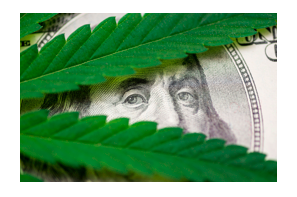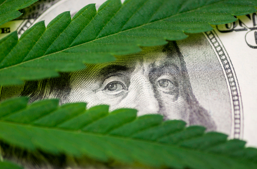The Federal Government’s cannabis laws are outdated. Cannabis was first banned at the federal level in 1937, but the current cannabis laws in effect were not set until the Controlled Substances Act of 1970. At present, the Feds deem cannabis to have “no currently accepted medical use and a high potential for abuse.” As a Schedule I drug, cannabis is put on par with heroin, ecstasy and peyote in its likelihood for causing harm.
As states and cities within the United States revolutionize their cannabis stance — and reap the rewards — the Federal Government continues to drag its feet in updating its decades-old cannabis regulations. Considering that there is ample evidence refuting the federal law’s claims about cannabis’s dangers and lack of medical applications, why don’t federal legislators work to update the law if not abolish it altogether? The answer, it seems, might be money.
Big Pharma Pays to Keep Cannabis Industry Under Control
Western Medicine relies heavily on pharmaceutical companies to deliver medicines that treat and cure myriad disorders, diseases and health conditions. As a result, the worldwide pharmaceutical market is worth about $1.3 trillion, and the top 10 pharma companies cumulatively earn over $392.5 billion per year.
Unfortunately, changing cannabis laws could put a dent in those profits. In states that have legalized medical marijuana, patients tend to be willing to forego traditional pharmaceuticals in favor of cannabis treatments, which are perceived as more natural, safer, gentler, more affordable and more fun. Even better, many states that have legalized cannabis to some degree allow qualified users to grow weed at home, which further reduces the financial burden of such medical treatment. Already, Big Pharma is losing more than $166 million annually to the cannabis industry; if all 50 states were to legalize medical marijuana, experts believe Big Pharma’s losses would total more than $4 billion.
It makes sense, then, that pharmaceutical companies are active in discouraging updates to federal cannabis law. Though it is impossible to know exactly how much money is spent to convince politicians of the dangers of legalizing weed, it is known that Big Pharma is the leading lobbyist in Washington, D.C., contributing hundreds of millions of dollars every year toward influencing political decision-making. Because so many politicians rely on campaign contributions from Big Pharma, many are loath to tinker with federal cannabis law until pharmaceutical companies say otherwise.
The Feds Already Collect Taxes From Canna-businesses
One of the most prominent arrows in cannabis advocacy’s quiver of reasons to legalize weed is taxation: Taxes on the cannabis industry could help to close the annual budget deficit, which would benefit the nation and the national economy. There’s just one problem — the Federal Government already taxes the cannabis industry.
Federal law allows the government to tax criminal enterprises. In fact, tax law prevents criminal organizations from taking any kind of deduction; because cannabis businesses operate illegally (at least to the Feds), they are unable to consider taking typical corporate credits or deductions that might lower the amount of tax they are responsible for paying. Ultimately, this means the Federal Government is already wringing as much money from cannabis businesses as they possibly can. Even if the Feds levy additional federal taxes to weed, like the excise taxes present in many states, the government will lose money by giving canna-businesses access to deductions.
But Won’t Legal Cannabis Be Good for the Economy?
Unequivocally, cannabis legalization would be good for the economy. Illinois dispensaries, grow operations, laboratories and other canna-businesses have generated millions in tax revenues in under a year, and they have created tens of thousands of jobs, which spurs economic growth in other industries. Opening the legal cannabis industry to every state, without current federal restrictions, would give cannabis businesses even more opportunities to grow and thrive, radically improving the American economic landscape.
However, as attractive as the economic benefits of cannabis might be to federal lawmakers, many are balancing economic opportunities with preconceived (and outdated) notions about cannabis’s physical and psychological effects. Considering that the Feds are already making bank on the cannabis industry, and considering that many believe cannabis consumption to be immoral or dangerous, the likelihood of an updated cannabis law at the federal level seems abysmally low.




















